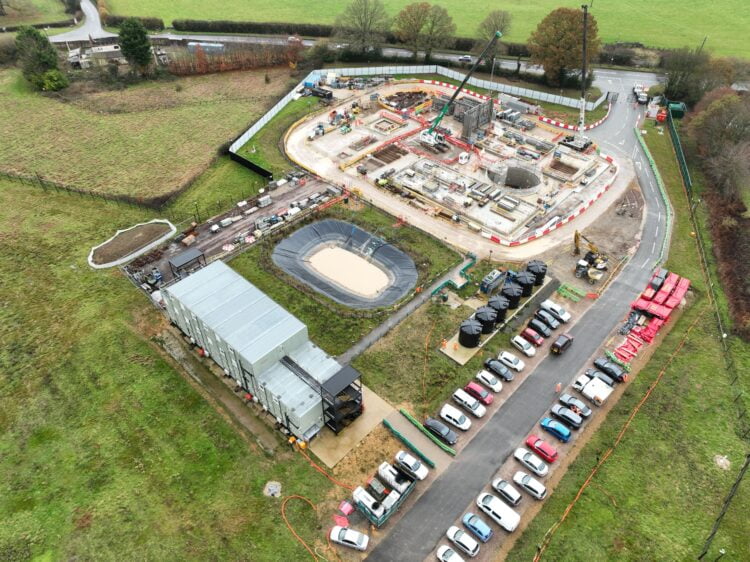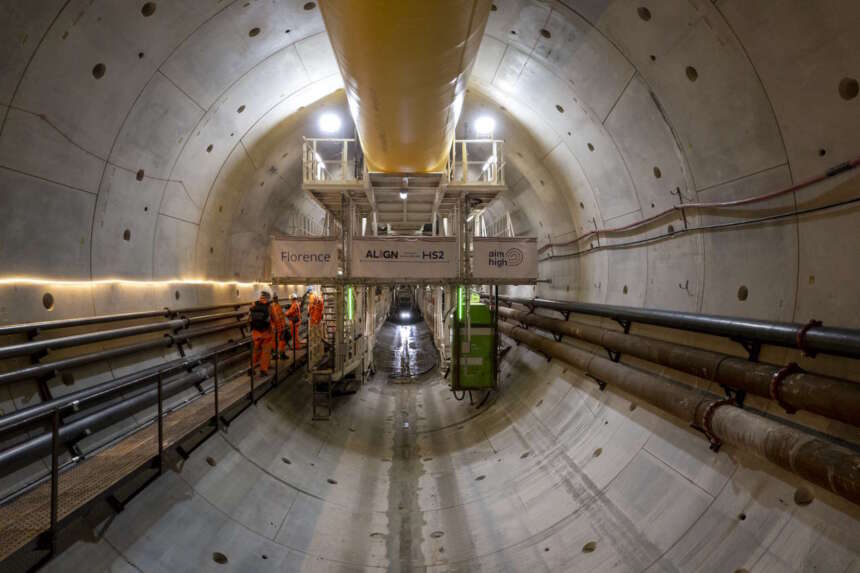One of HS2‘s longest tunnels is now 90% complete as two giant tunnelling machines have reached the intervention shaft at Chesham Road.
The machines, named ‘Florence‘ and ‘Cecilia', are expected to complete their ten-mile journey under the Chilterns next year. Excavation of the twin-bore tunnel, which will run between the M25 and South Heath in Buckinghamshire, will have taken two and a half years. The 2,000-tonne tunnelling machines are digging the project's longest tunnels. In all, HS2 will require 64 miles of tunnelling and five Tunnel Boring Machines (TBMs) are already in the ground. Three more are ready to begin work and another two will be delivered next year.
Alongside the Chiltern tunnels, two TBMs are currently excavating the London tunnels. Two more will launch soon. Another TBM is excavating the Bromford tunnel in Birmingham with another ready to go. The two machines to be delivered next year will excavate the Euston tunnels.
Each of the Chiltern TBMs is a 170m-long self-contained underground factory, with a crew of 15 people, working in shifts and support by more than 100 people on the surface. Not only do the machines dig the actual tunnel, but they are able to line it with 56,000 concrete segments which form rings and then grout them into place at the machine moves forward. Designed especially for the geology of the Chilterns, they have excavated around 2.8m cubic metres of chalk and flint since their launch in summer 2021. The two machines are operated by Align, a joint venture formed of Bouygues Travaux Publics, Sir Robert McAlpine and VolkerFitzpatrick.

Four other shafts have also been constructed to provide ventilation and emergency access. These are located near Chalfont St Peter, Chalfont St Giles, Amersham and Little Missenden. Work is now in progress to create internal structures and surface-level headhouses. The shaft at Great Missenden, which is 42m deep and has been reached by the TBM has now reached, is largely hidden behind a hedge and line of mature oak trees next to the B485. The headhouse will be built on top of the shaft has been specifically designed to resemble local farm buildings. New planting will help blend it into the surrounding landscape. The Chesham Road shaft will only be used for emergency access, while the others will also contain ventilation equipment.
Construction of all the tunnels will involve the excavation of approximately 3m cubic metres of material. This will be used for landscaping. Once construction is complete, the temporary buildings at the south portal will be removed and the site landscaped with around 90 hectares of wildlife-rich chalk grassland habitats. Chalk grassland used to be widespread across the hills of southeast England and are considered habitat of international conservation significance with just 700ha left across the Chilterns.
Once complete, HS2 will help improve connections between London, Birmingham and the North while creating space on the most congested part of the existing West Coast Main Line.
Mark Clapp, HS2 Ltd's Head of Delivery, said: “Once complete, HS2 will transform journeys between London and the West Midlands and free up space on the busiest part of the West Coast Main Line. We're making great progress in the Chilterns, with 90% of the tunnel excavation now complete. That's an incredible engineering achievement and I look forward to the breakthrough, next year.”
Didier Jacques, Align's Underground Construction Director, added: “With our first TBM Florence having reached our fifth shaft at Chesham Road and our second TBM Cecilia due to reach the shaft shortly, this a great achievement for not only the tunnelling team, but also the supporting teams on the surface at the South Portal, manufacturing the concrete segments required to line the tunnels and processing the spoil from the tunnels.
“We are looking forward to continuing the good progress with the TBMs, which are due to complete their drives early next year.”

















